 |
 |
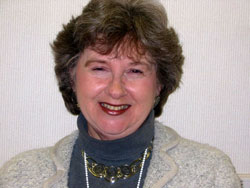
|
|
Linda Doty, M.S.W., R.N., Research Social Worker, National Institute on Alcohol Abuse and Alcoholism, National Institutes of Health, Bethesda, Maryland
|
1. I chose this career because...
2. My typical workdday involves...
3. What I like best/least about my work...
4. My career goals are...
5. When I'm not working, I like to...
6. My career planning advice is...
|
|
1. I chose this career because...
|
Back to Top

|
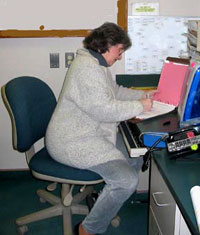
|
|
Linda Doty keeps a daily record of patient progress.
|
I chose to become a social worker because I wanted to be in a profession where I could help other people. There was one person, in particular, who influenced my career choice. As a teenager, one of the priests in my church was actively involved in helping the poor and less fortunate. He would routinely take our youth group to the soup kitchens in New York City to help serve the food. It was typical to see many alcoholics and drug addicts on the street corners near these community-based shelters. Because of the time I spent helping the needy and the homeless, I began to think about pursuing a career where I could help others.
Career Planning
After completing community college, I entered the University of Miami as a nursing major. At some point, I realized that I wanted to be more than a nurse, so I followed the recommendation of one of my nursing instructors to consider the field of social work. In my first social work class, the instructor took a special interest in me. She strongly encouraged me to enter the field. Ultimately, I decided to pursue both social work and nursing. I felt that one career would build upon the other. My primary goal was to find a career where I could help people maintain both their physical and emotional health. I wanted to help them recover from personal challenges and illnesses so that they can lead more productive lives.
Another important aspect of my career planning was to aim for job security. I wanted a job where I could always find a position and support myself. My father was laid off from his job during an economic recession. Unfortunately, this happened while I was in college, which altered my educational plans. I obtained a job as a medical secretary, and completed my studies at night. The experience of my father’s job loss, and how it profoundly affected our family, reinforced my desire to help others through their difficult times.
Education
- Associate of Business Science, Medical Secretarial, Vernon Court Junior College, Newport, Rhode Island
- Bachelor of Arts, Double Major: Sociology and Politics and Public Affairs, University of Miami, Coral Cables, Florida
- Master of Social Work, Administrative Concentration, Barry University, Miami Shores, Florida
- Associate of Nursing Science, Accelerated Nursing Option Program, Miami Dade Community College, Miami, Florida
Graduate School – Social Work
I attended graduate school about 5 years after completing my undergraduate degree. I learned of a part-time evening graduate program in social work, the first of its kind offered at a local university. With this program, you could continue working full-time for the first two years while attending core classes in the evenings and summers. By the third year, you were required to attend full-time. An internship and placement in a variety of settings was required for each year.
I was able to obtain an approved leave of absence from my job and completed my degree by working full-time and part-time the first two years. During my last year, I lived off my savings, obtained a government sponsored college loan, and worked part-time until I graduated. After that I was reinstated into my position with full benefits and salary.
Although obtaining my degree was financially stressful, I was able to follow through by learning about my options and carefully planning ahead.
Return to Nursing
Four years after I received my masters degree, I learned about an accelerated nursing program at Miami Dade Community College in Miami. The prerequisites for this program, require that you have a bachelors or masters degree in another field. The program took one year to complete. I was accepted into the program, thereby satisfying my combined goal of being a registered nurse, as well as, a social worker.
The National Institutes of Health (NIH)
Eventually, my career led me to the National Institute of Alcohol Abuse and Alcoholism (NIAAA), NIH. I chose the field of chemical dependency because I considered it a challenge and an important public health concern for our nation.
|
|
2. My typical workdday involves...
|
Back to Top

|
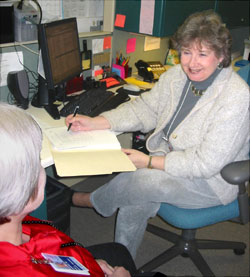
|
|
Linda Doty talks with a colleague at NIAAA.
|
My typical workday as a research social worker with NIAAA, is not the typical workday of a clinical social worker. For example, I don’t facilitate therapeutic groups, carry a patient caseload or plan discharge referrals. Having worked as a clinical social worker for years with those responsibilities, I wanted something different.
My Primary Responsibilities
My primary responsibilities with NIAAA are to obtain psychological data that supports our research studies. I obtain this data by administering research instruments – questionnaires and interviews that include medical and psychiatric histories used to assess patient’s health - in a clinically structured format. For example, I administer extensive alcohol and drug questionnaires and use a social rating index scale, which includes the patient’s highest level of education and the job where they made the most money. During interviews, I usually provide patients with information that will help them to better understand their drug or alcohol dependency. I also try to develop a better understanding of the patient’s immediate (spouse and children) or extended family members (parents, siblings, grandparents, aunts/uncles) to identify any psychiatric or chemical dependency problems. All the information gathered aids in establishing the psychiatric diagnosis and ultimate treatment plans.
Seven different research instruments are used to obtain the data we need. It can take 4 to 6 hours per patient to administer these instruments. I collect this data on every patient who comes into our 11-bed inpatient alcohol research unit. I also see healthy volunteers, without drug or alcohol problems, who are participants from the community. These volunteers receive the same research instruments as our patients. Correlating volunteer data with patient data forms the basis of our psychological research, and supports the medically-based research being done by our institute.
During a typical workday, I:
- Conduct an extensive patient interview
- Consult with the principal investigator on the research study in which the patient is participating
- Notify the patient's attending physician about any medical or psychiatric concerns
- Confer with the patient's primary nurse to insure discharge plan continuity
- Read and respond to emails throughout the day
Additional Roles and Activities
- Associate Investigator – Conduct research studies in collaboration with colleagues.
- Co-author – ICo-author research papers on alcohol studies for publication in professional journals.
- Event Facilitator – Facilitate the yearly National Alcohol Screening Day held on the NIH campus. Since I have an interest in health education I have also coordinated the NIAAA sponsored health fairs.
- Speaker – Present posters and research results on various studies at national professional associations.
- Mentor - In conjunction with the Department of Social Work, I have had a social work student intern with me 1 day a week for the semester. In this way, students are exposed to the research aspect of the social work profession.
- Screening Applicants – Assist my social work colleague by screening applicants (using a psychosocial evaluation) to determine if they meet the selection criteria for our current research studies.
|
|
3. What I like best/least about my work...
|
Back to Top

|
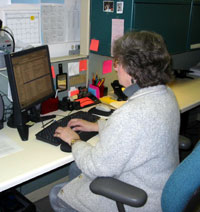
|
|
Linda Doty responds to e-mail in her office.
|
What I like best about my work is interacting with a lot of people in a medical setting, and learning information relevant to our studies that ultimately helps others. I like to think of it as professional detective work. I have learned that by being empathetic and helping patients feel at ease, they are more likely to open up and share information. The more they share, the more I can help them with appropriate interventions. Lastly, I love working at NIH because of the daily intellectual stimulation.
What I like least about my work is simple – all the paperwork involved.
|
|
4. My career goals are...
|
Back to Top

|
My career goal is to become published as a first author on an area of specific interest in the research data.
|
|
5. When I'm not working, I like to...
|
Back to Top

|
When I’m not working, I like to travel and explore new and different places. I will be traveling to Australia next year to visit my nephew. He is in graduate school at the University of Melbourne on a National Rotary Club Scholarship. Some of my travel plans include visiting two college friends. We usually get together every year, and meet at our homes in Washington DC, Atlanta, and Florida, or somewhere in between. I also like attending family events, going to movies and concerts, eating out and reading.
I am on the Board of Director’s and Past Chair of the Recreation and Welfare Association at NIH. This is a non-profit association that provides support for many NIH-sponsored events for patients and their families. We have a fitness center and 5 gift shops.
I am Regional Chair for the Miami Circle - a group of University of Miami alumni in the local metropolitan area. We visit high schools and community sponsored college fairs as representatives for the university. We also support University of Miami Information Sessions specifically tailored to high school students who have a strong interest in attending the university.
I also serve on the board of my local homeowners association where I reside.
|
|
6. My career planning advice is...
|
Back to Top

|
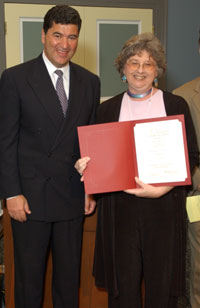
|
|
Linda Doty accepts an award from NIH Director, Elias A. Zerhouni, M.D., for her participation in Share the Health Day, April 2004.
|
If you are a recent high school graduate, it is quite acceptable to be uncertain about what you want to do with the rest of your life. Many of us change majors more than once. I feel it is advantageous to blend more than one profession or field of study. Ultimately, you make yourself more marketable. I wanted increased flexibility, financial security, and easier employability. At the same time, I wanted to do something I enjoyed and felt was worthwhile. Both of my fields have afforded me those opportunities, and helped me to achieve my goals.
I chose the public sector over the private sector, again for greater job security and benefits. Likewise, I didn’t want patient care to be potentially limited or restricted to ‘ for profit ‘ agencies.
When choosing your own profession, I believe it is important to maintain the integrity of your personal and professional values and goals.
As a profession, social work can be entered into at any age. It is a profession in which life experiences can be an asset used to help others. To illustrate this on a more personal note, my sister-in-law, who is in her late 40’s, has just completed a Masters of Social Work program. Her daughter is a sophomore in college who is seriously considering the profession as well.
|
|
|
|
 |